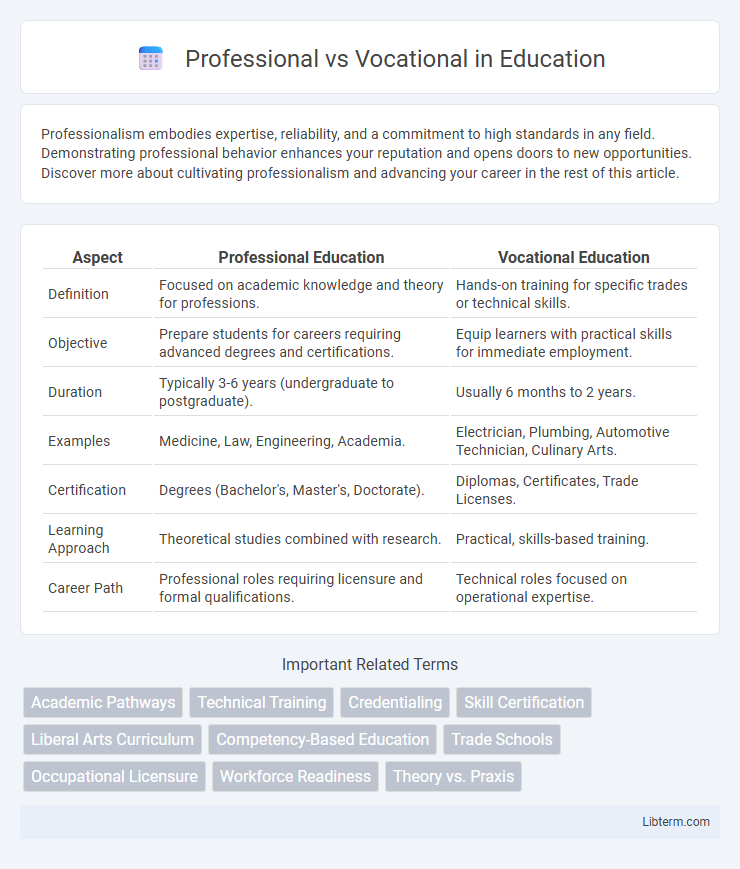Professionalism embodies expertise, reliability, and a commitment to high standards in any field. Demonstrating professional behavior enhances your reputation and opens doors to new opportunities. Discover more about cultivating professionalism and advancing your career in the rest of this article.
Table of Comparison
| Aspect | Professional Education | Vocational Education |
|---|---|---|
| Definition | Focused on academic knowledge and theory for professions. | Hands-on training for specific trades or technical skills. |
| Objective | Prepare students for careers requiring advanced degrees and certifications. | Equip learners with practical skills for immediate employment. |
| Duration | Typically 3-6 years (undergraduate to postgraduate). | Usually 6 months to 2 years. |
| Examples | Medicine, Law, Engineering, Academia. | Electrician, Plumbing, Automotive Technician, Culinary Arts. |
| Certification | Degrees (Bachelor's, Master's, Doctorate). | Diplomas, Certificates, Trade Licenses. |
| Learning Approach | Theoretical studies combined with research. | Practical, skills-based training. |
| Career Path | Professional roles requiring licensure and formal qualifications. | Technical roles focused on operational expertise. |
Understanding Professional and Vocational Education
Professional education concentrates on theoretical knowledge and skills required for careers such as law, medicine, or engineering, emphasizing intellectual development and research. Vocational education focuses on practical training and hands-on experience tailored for skilled trades and technical occupations like carpentry, automotive repair, or culinary arts. Understanding the distinction highlights the tailored approaches in curriculum design, where professional pathways prioritize academic rigor and vocational routes emphasize workforce readiness.
Key Differences Between Professional and Vocational Paths
Professional paths emphasize theoretical knowledge and advanced education, preparing individuals for careers requiring specialized expertise and often certification, such as law, medicine, or engineering. Vocational paths focus on practical skills and hands-on training tailored to specific trades like carpentry, plumbing, or culinary arts, enabling rapid entry into the workforce. The key difference lies in the balance of academic learning versus applied skills, with professional routes demanding longer schooling and vocational routes offering quicker, skill-based job readiness.
Types of Careers in Professional and Vocational Fields
Professional careers typically include fields such as medicine, law, engineering, and academia, which require advanced education and formal qualifications. Vocational careers encompass trades like electrician, plumbing, automotive repair, and culinary arts, emphasizing hands-on skills and practical training. Both career paths offer specialized expertise but differ in educational requirements and job functions.
Educational Requirements: Degrees vs Certifications
Professional education typically requires earning formal degrees such as bachelor's, master's, or doctoral degrees from accredited institutions, emphasizing theoretical knowledge and comprehensive study. Vocational education prioritizes certifications and diplomas that focus on practical skills and hands-on training tailored to specific trades or occupations. The distinction lies in professional paths demanding extensive academic qualifications, while vocational routes emphasize industry-recognized credentials for immediate workforce entry.
Skills Development in Professional and Vocational Training
Professional training emphasizes theoretical knowledge and specialized skills necessary for careers in fields such as law, medicine, and engineering, promoting critical thinking and advanced problem-solving. Vocational training concentrates on practical, hands-on skills tailored for specific trades like carpentry, plumbing, or cosmetology, enabling immediate workforce entry. Both approaches prioritize skills development, but professional training aims at academic proficiency while vocational training targets technical expertise for skilled labor.
Advantages of Pursuing a Professional Career
Pursuing a professional career offers advantages such as higher earning potential, greater job stability, and access to specialized knowledge and skills that are highly valued in the labor market. Professional careers often provide opportunities for continuous learning, career advancement, and networking within respected industries like law, medicine, engineering, or finance. These benefits contribute to long-term growth and a deeper sense of personal achievement compared to vocational paths.
Benefits of a Vocational Education
Vocational education offers targeted skill development tailored to specific trades, enabling faster entry into the workforce compared to traditional professional degrees. It provides hands-on training that directly aligns with industry demands, increasing employability and job readiness. Cost-effective and often shorter in duration, vocational programs reduce student debt and meet the needs of employers seeking practical expertise.
Job Market Demand: Professional vs Vocational Roles
Professional roles typically require advanced degrees and specialized knowledge, which align with high-demand sectors such as healthcare, engineering, and information technology. Vocational roles emphasize practical skills and certifications, filling critical needs in trades like plumbing, electrical work, and automotive repair, where hands-on expertise is essential. Job market demand for both professional and vocational roles remains strong, driven by evolving industry needs and the ongoing shortage of skilled workers in each category.
Salary and Career Growth Comparison
Professional careers typically offer higher salary potential and more substantial long-term career growth compared to vocational careers, driven by advanced degrees and specialized skills. Vocational careers provide faster entry into the workforce with steady income but often face slower salary progression and limited advancement opportunities. Data from the U.S. Bureau of Labor Statistics indicates that professionals in fields like engineering and healthcare earn median salaries 30-50% higher than those in vocational trades such as plumbing or electrical work, reflecting broader career development prospects.
Choosing the Right Path: Factors to Consider
Choosing between professional and vocational paths depends largely on individual career goals, required skill sets, and desired work environments. Professional careers often demand higher education and are associated with industries like law, medicine, or engineering, while vocational paths prioritize hands-on skills and certifications in trades such as plumbing, electrical work, or culinary arts. Key factors to consider include job market demand, potential income, educational commitment, and personal aptitude for theoretical versus practical learning.
Professional Infographic

 libterm.com
libterm.com